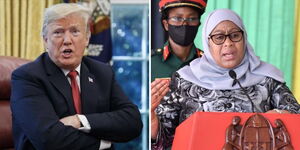The Orange Democratic Party (ODM) has announced plans to commence its grassroots elections at the end of this month (April 2024).
The decision comes amidst a cash crunch, with the party opting to spread the nationwide exercise over three days.
The announcement was made on Wednesday, April 3, following a central meeting of the party.
ODM Secretary General, Edwin Sifuna, revealed that the elections would kick off from April 27.
Sifuna outlined the staggered approach, with elections in Kwale, Busia, and Siaya counties set for April 27, followed by Kajiado, Migori, and Wajir on April 29. The final round of elections for Kisii, Vihiga, and Muranga counties will take place on April 30.
However, the party stated that a detailed timetable for elections in other county branches would be released at a later date.
ODM has voiced concerns over what it perceives as government-induced funding shortages for political parties. The party lamented the state of the Political Parties Fund, which was established to bolster democracy by facilitating active participation in political life and covering election expenses.
"The Political Parties Fund was established to enhance democracy by promoting active participation by individuals in political life. Among other things, it is meant to cover the election expenses of the political parties and the broadcasting of policies of the political parties," stated the party in a press release.
ODM accused the Kenya Kwanza administration of deliberately withholding funds from political parties, thereby crippling their operations. The party further asserted that the lack of funding has made planning and executing key activities, including the scheduled party elections, increasingly challenging.
"Since coming to office, the Kenya Kwanza regime has pursued a deliberate policy of denying funds to the parties, effectively crippling their operations," the statement read. Adding, "Clearly, the aim is to kill all political parties except UDA. We demand that the funds be immediately released to parties in amounts and manner stipulated by law."
According to figures released by the National Treasury in the previous fiscal year, Kenya's Political Parties Fund allocated a substantial sum of Ksh1.48 billion to support the activities of numerous political parties across the country.
Leading the pack in funding allocations is President William Ruto's United Democratic Alliance (UDA) Party, which is set to receive the largest portion of the fund. Records from the Office of the Registrar of Political Parties reveal that UDA secured a significant allocation of Ksh577.2 million.
Following closely behind are other prominent parties, with the Orange Democratic Movement (ODM) receiving Ksh308.3 million, the Jubilee Party receiving Ksh135.1 million, and the Wiper Party securing Ksh72.1 million. The Democratic Action Party of Kenya (DAP-K) completes the top five recipients, with an allocation of Ksh31.6 million.
Speaker of the National Assembly Moses Wetangula provided insight into the distribution of MPs among these parties, indicating UDA's dominance with 145 MPs, followed by ODM with 86, Jubilee with 28, and Wiper with 26. Other parties, such as the United Democratic Movement (UDM), ANC, Ford-Kenya, KANU, DAP-Kenya, PAA, Kenya Union Party, UPIA, Maendeleo Chap Chap, and The Service Party, also have varying representation in Parliament.
In the Senate, UDA continues to maintain a significant presence, boasting the highest number of representatives, with at least 32 out of 67 senators affiliated with the party.
The Political Parties Act of 2011 mandates that 0.3 per cent of the national government revenue be allocated to finance the activities of political parties.
This allocation is distributed based on several criteria, including the total number of votes secured by each political party in the preceding general election, the number of elected leaders from the special interest category, administrative expenses, and the number of nominated leaders.












